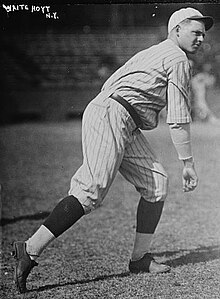Waite Hoyt
| Waite Hoyt | |||
|---|---|---|---|
 |
|||
| Pitcher | |||
|
Born: September 9, 1899 Brooklyn, New York City, New York |
|||
|
Died: August 25, 1984 (aged 84) Cincinnati, Ohio |
|||
|
|||
| MLB debut | |||
| July 24, 1918, for the New York Giants | |||
| Last MLB appearance | |||
| May 15, 1938, for the Brooklyn Dodgers | |||
| MLB statistics | |||
| Win–loss record | 237–182 | ||
| Earned run average | 3.59 | ||
| Strikeouts | 1,206 | ||
| Saves | 52 | ||
| Teams | |||
| Career highlights and awards | |||
|
|||
| Member of the National | |||
|
|
|||
| Inducted | 1969 | ||
| Election Method | Veteran's Committee | ||
Waite Charles Hoyt (September 9, 1899 – August 25, 1984) was an American right-handed pitcher in Major League Baseball, one of the dominant pitchers of the 1920s, and the most successful pitcher for the New York Yankees during that decade. He was inducted into the Baseball Hall of Fame in 1969.
Hoyt was born in Brooklyn, New York to Addison and Louise Benedum Hoyt and attended Erasmus Hall High School.
Despite being a Dodgers fan, he was signed to a professional contract by New York Giants manager John McGraw when he was but 15. Because of his extreme youth, he was immediately nicknamed "The Schoolboy Wonder".
After a brief stint with the Giants, McGraw sent Hoyt to the minors for refinement and experience. Hoyt soon returned to the majors, this time with the Boston Red Sox. His performance there attracted the attention of the Yankees, who acquired him in 1920. In his first season as a Yankee, he won 19 games and pitched three complete games in the World Series without allowing an earned run — over his career, he would win six American League pennants with the Yankees and one with the Philadelphia Athletics. In his finest years with the Yankees, 1927 and 1928, Hoyt would post records of 22 wins and 7 losses with a 2.64 ERA and 23 wins and 7 losses with a 3.36 ERA. During his 21-year career, he won 10 or more games 12 times, 11 of them consecutively. Hoyt pitched for eight years after leaving the Yankees in 1930, but did not consistently display similar levels of pitching dominance.
...
Wikipedia
